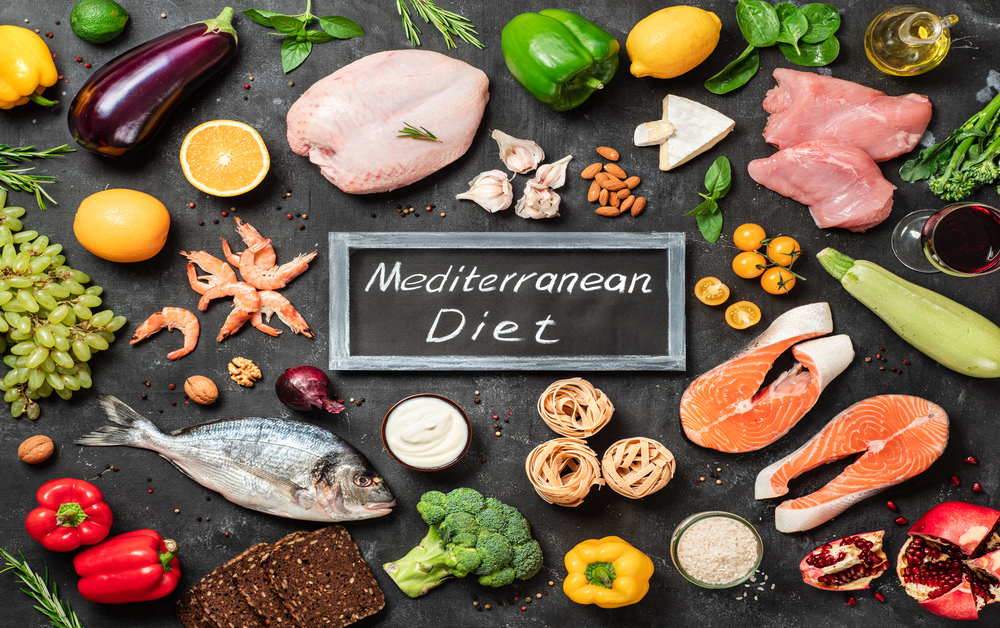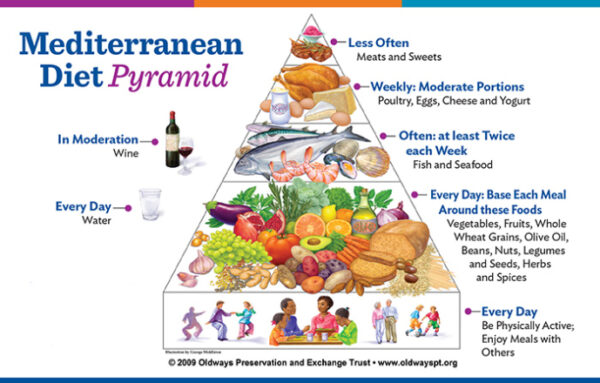What is a Mediterranean Diet?
Mediterranean Diet is a generic term for the traditional eating habits of the people from countries bordering the Mediterranean Sea including France, Greece, Italy, and Spain. It has a range of different definitions as these countries have different eating norms. However, there are some common factors that line up the Mediterranean diet. In general, it is a plant-based diet consisting of vegetables, fruits, legumes, beans, cereals, nuts, fish, and olive oil.
History
The concept of the Mediterranean diet emerged in the 1960s when it was observed that the prevalence of coronary diseases was more in America and Northern Europe than in Mediterranean countries like Greece, Spain, and Italy. Since then many observational studies have associated Mediterranean Diet with low mortality rates.
The Dietary Guidelines for Americans recommends the Mediterranean diet to promote good health and to prevent heart disease, strokes, diabetes, and other chronic diseases.
Mediterranean Diet Includes
Mediterranean Diet accounts for 50-60% daily calories from Carbohydrates, 25-35% daily calories from fat, and the rest of calories come from proteins. The core principles include:
- EAT PLENTY: Fruits, vegetables, nuts, seeds, legumes, beans, whole grains, and olive oil
- EAT-IN MODERATION: dairy products, eggs, cheese, yogurt, and fish
- EAT RARELY: Red meat, processed and packaged food, sugar-sweetened beverages, refined grains, refined oils
General Guidelines
- Add 5 servings of vegetables and 2 servings of fruit to the diet daily.
- Consume 3 servings of whole grains per day.
- A handful of nuts per day.
- Eat fish at least twice a week.
- Limit intake of saturated fats from red meat, and processed food.
- Use olive oil instead of vegetable oil or butter while preparing food.
- Consume dairy or dairy created products – opt for low-fat dairy products
- Choose foods and drinks that are low in fat, salt, and sugar
Benefits of Mediterranean Diet
- Promotes Heart Health – Mediterranean Diet is known to promote heart health. The diet combined with a low-fat diet slows down the progression of plaque buildup in the arteries. Thus, reducing the risk of developing heart diseases.
- Promotes weight loss – Mediterranean diet helps to lose weight in a healthy and sustainable way. The plant-based diet and the low calories of the diet lead to weight loss.
- Promotes brain health – Adopting a Mediterranean diet is associated with better mental health as it slows cognitive decline and prevents the development of Alzheimer’s.
- Promotes blood sugar control – The healthy eating pattern of the Mediterranean diet helps to stabilize blood sugar levels and prevents Type 2 diabetes. Insulin sensitivity also improves with the Mediterranean diet.
- Protects against cancer – Research has shown that the Meditteranean diet protects against cancers such as breast cancer, colorectal cancer, and other types of cancers.
Foods allowed
- Vegetables: dark green leafy vegetables, cauliflower, Brussel sprouts, cucumbers, potatoes, sweet potatoes, turnips.
- Fruits: apples, bananas, oranges, pears, strawberries, grapes, dates, figs, melons, peaches
- Nuts, seeds, and nut butter: almonds, walnuts, hazelnuts, cashews, sunflower seeds, pumpkin seeds, peanut butter, peanuts
- Legumes: beans, peas, lentils, pulses
- Whole grains: oats, brown rice, rye, barley, corn, whole wheat products
- Poultry: chicken, turkey
- Dairy: cheese, yogurt, milk
- Herbs and spices: garlic, basil, mint, rosemary, sage, nutmeg, cinnamon, pepper
- Healthy fats: extra virgin olive oil, olives, avocados.
Foods to Limit
- Added sugar: Limit intake of food items high in added sugars. Soda, candies, ice cream, table syrup, and baked items are high in added sugars.
- Refined grains: Limit Food items such as white bread, pasta, tortillas, chips, crackers.
- Trans fats: Margarine, fried foods, and other processed foods contain trans fat.
- Refined oils: soybean oil, canola oil, cottonseed oil, grapeseed oil
- Processed meat and food: These include processed sausages, hot dogs, deli meats, beef jerky, fast food, convenience meals.
Bottom Line
According to a recent report on the ranking of diets, the Mediterranean diet was ranked at the top of the list. Thus, the Mediterranean diet is the best diet to be made part of our lives.
Nutrition professionals and researchers regard the eating style of people in Spain, Italy, and Greece (Mediterranean diet) to be the gold standard for healthy eating. Also, people on the Mediterranean diet are more likely to live longer and healthier lives.
Research supports the use of the Mediterranean diet as a healthy eating pattern for the prevention of cardiovascular diseases, increasing quality of life, and healthy aging. The diet may also support healthy weight loss when combined with caloric restriction.










